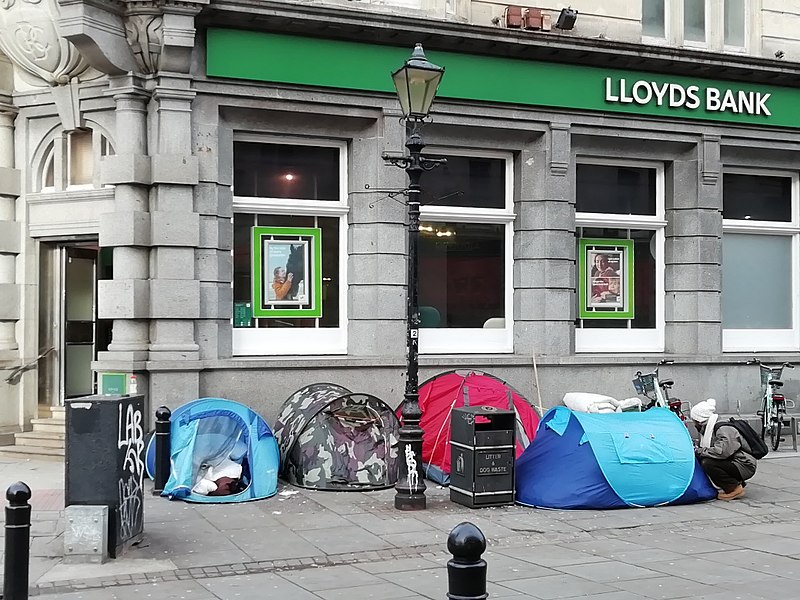For many people in Britain, the word “broke” sums up two slightly different but intertwining concepts: not having any money of your own and a public realm that is falling to pieces under the weight of organisational issues, underfunding, and ever growing backlogs. Both meanings of the word are at the core of Broke, the insightful and brutally honest new book edited by Tom Clark of the Joseph Roundtree Foundation.
The book is not only about poverty, which is endemic throughout our society, but also how our current state infrastructure is unable to cope with it. One of the few areas the main parties can agree on is that there is something wrong with the current housing, benefits, and health care systems in the UK. Where the parties differ is in their analysis of the causes and the solutions to the groaning and creaking nature of the British state. Broke does not aim to stick to one or another rigid party line; it is, as all good journalism most surely is at its core, about telling the story of individuals through the lens of our faltering society.
Opening with a moving forward by Kerry Hudson, explaining how poverty affected her life, Broke begins as it means to go on – putting real-life experience at the heart of the book. Whilst statistics are useful in themselves, they do not have the same impact on a basic emotional level as reading about how Kerry Hudson felt shame at being bullied for receiving free school meals. The rawness of her foreward sets the tone for the rest of the book which focuses as much on the individuals who are suffering through the failures in the system as the reasons that the systems that are analysed are failing in the first place.
It is particularly moving to realise through reading the book the sheer number of people who have been brought to a mental and physical breaking point because of the continual failures of the British state. Each essay features a variety of people who have gone through hell because of failures in the housing market, social care system and society in general. Whether it is Tracy Benson, who was served with a no fault eviction notice and forced to find a new home for her son and pets simply because she asked her landlord to deal with mould in her home, or Yvonne a member of the Windrush generation and a former social worker who was left with no option but to go to a food bank in order to get food to eat, the picture is a familiarly grim one of a country that is failing in its basic duty of care to its citizens.
These accounts are skilfully stitched to one another by the authors of each essay, allowing for a natural narrative flow from one account to another, which helps to build a picture of what needs to change. In the book’s opening essay, Uprooted: No Place Like Home, journalist Jem Bartholomew focuses on the housing market. Bartholomew makes clear that the failure to build more homes, and reform the burgeoning private rental sector, has caused a situation where countless renters have faced homelessness by the whims of individual landlords. Equally apparent from the Finanical Times journalist Jennifer William’s essay Pay Later? Of Debt and Dread is the need to stamp out the loan sharks using social media, encourage discussions about debt and what help is available if you fall into it. The Centre for Social Justice who are quoted throughout this essay refer to Britain as a “nation of money secrets”. A comment that equally sums up the feeling of guilt and shame felt by all the individual’s whose stories are related in the book, and the potential for subsidised saving schemes and mutual credit unions to help people who need financial support. The journalists writing the essays expertly balance the solutions with extensive quotes directly from the people they interview, allowing for their voices to be heard clearly without being filtered by the authors.
It is a testament to the skill of Tom Clark’s editing that all of the authors are able to work their solutions so effortlessly into each essay whilst avoiding disjuncture with the more personal accounts. Alongside previously mentioned essays, others that particularly stand out are Dani Garavelli’s A Window on Frailty: From Deprivation to Disease, a heart rending account of how poverty is interlinked with disease and only by tackling one can you eradicate the other, and Daniel Trilling’s frank exposé of the failures that beset the current immigration and asylum system, Destitute by Design: Trapped in the immigration system.
Many of the solutions offered are not, by any means, easy fixes. Indeed, the extent of the problems that the public face on an everyday basis are clearly monumental and, regardless of who is in government, will take years to fully fix. This book does not seek to provide exact concrete solutions to each of these issues; rather, it serves as a warning of how negligent we have become regarding the entropic collapse of services that are relied on by millions of people. It is a reflection on how British society has failed to solve the basic issues of providing adequate homes, food, employment, and emotional, mental and physical support for vast swathes of the population. It’s easy to forget how deep many of the societal failures run and if you read Broke for any reason be it for this one – to remind yourself of how angry you should be at the state Britain is in and commit yourself to making a positive change. For things can and only will change when we accept how broken everything truly is.


